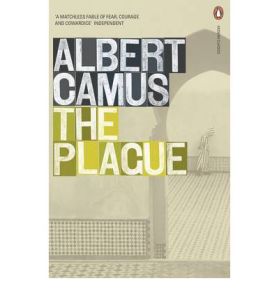 There’s a minor character in Albert Camus’ brilliant novel The Plague who spends years and years agonising over the structure and wording of the opening sentence of a novel he plans to write. He’s torn between a multitude of variations of the sentence, convinced that if he can just get that one sentence right the rest of the novel will automatically flow onto the page.
There’s a minor character in Albert Camus’ brilliant novel The Plague who spends years and years agonising over the structure and wording of the opening sentence of a novel he plans to write. He’s torn between a multitude of variations of the sentence, convinced that if he can just get that one sentence right the rest of the novel will automatically flow onto the page.
It’s a wonderfully comic element in a very bleak novel, but it struck home with me when I read it. While I was not as extreme in my agonising over each sentence of my stories, the fact was I would work and rework each sentence and paragraph of my fiction to death, anxious that each word was just right before I could continue on to the next section of the story in question.
Of course the problem with that was a story took forever to complete. And, now that I look back at my earlier efforts, the result was always very stilted. And yet for many years, during which I would go through sporadic bursts of creativity when time permitted, I would still get hung up on every word and sentence as I wrote them. It’s a phenomenon I notice in the teenagers I teach Creative Writing to and in many adults starting out at writing. Also, I realise now, this approach was most likely engendered by my bursts of writing being only sporadic.
It’s only when I started to write more regularly that I began to feel this approach was not working for me. I knew I had to free myself up, loosen out my writing muscles, but couldn’t figure out how. Bizarrely, my epiphany struck only when I read Nigel Watts’ Write a Novel (in the Teach Yourself series). He suggested that a writer uses very different parts of the brain for writing and editing, a more purely creative section for outlining stories, developing characters and initial drafting and a more structured, almost mathematical section for redrafting and editing. He advised writers to get a first draft done as quickly as possible, to practically rush through it, covering the bases of the outline developed, even to skip over logistical plot problems if they threaten to slow the writing down. All this can be dealt with when you come back to the work for a second draft. The thing is, if you get that first draft done and dusted, while it will be far from perfect, you will have achieved something, you will have a finished first draft to work with. And there will be a freshness and immediacy to the piece (that hopefully won’t be leeched from it when you’re redrafting and editing).
Suddenly it all made sense. Suddenly I felt free to put whatever I liked on the page and worry about it later. It has resulted in my being far more productive with the time I have to write and I’m much happier with the results. And the more I take this new approach, the more I’m finding I have less to change in second and third drafts. Writers who have always used this approach will, no doubt, think I’m barking, but to those writers who have found themselves stuck in the rut I was I say, Try it. It’s very liberating.
I’ve a well-thumbed copy of that Nigel Watts book, but continue to obsessively, compulsively fine-tune as my words follow the text cursor. It’s probably because editing is so easy in text programs. Best way to achieve a rough draft is to write with pen on paper, I think.
Posted by John Robbins | November 22, 2011, 6:29 pmAbsolutely. All my first drafts are handwritten. For some bizarre psychological reason, I’m less afraid of committing words to the physical page than the virtual. At least for the first draft, anyway.
Posted by John Kenny | November 23, 2011, 11:19 amThannks for sharing this
Posted by Tania Kline | March 1, 2023, 2:31 pm